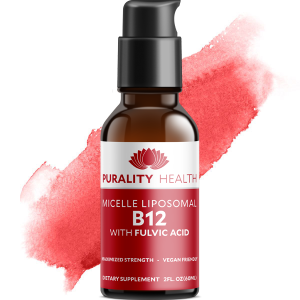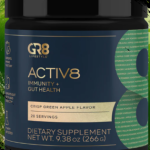Have you been feeling more tired than usual? Maybe you’ve had trouble focusing, experienced mood dips, or even noticed strange tingling sensations in your hands or feet.
While these symptoms could have a range of causes, there’s one silent culprit behind them that millions of people never suspect: vitamin B12 deficiency.
And here’s the shocking part…
Studies suggest that up to 40% of adults may have low or borderline B12 levels — and most have no idea.
It’s not just about what you eat, either. Even if your diet seems balanced, your body may be struggling to absorb this essential nutrient… leaving your brain, energy levels, and nervous system quietly suffering.
In this post, we’ll cover 7 surprising reasons B12 deficiency is so common, including how things like age, stress, medication, and gut health can work against your body — often without you realizing it.
If you’ve never considered B12 before, this might be the wake-up call your body’s been waiting for.
Let’s dive in.
1. Your Stomach Acid Is Too Low
Here’s something most people don’t realize:
In order for your body to absorb vitamin B12 from food, you need enough stomach acid.
That’s because B12 in food is bound to proteins and stomach acid is what “unlocks” it so your body can absorb it later on in the digestive process.
But here’s the problem…
Many people — especially those over 50 — have low stomach acid.
And millions more regularly take antacids or acid-reducing medications like omeprazole, pantoprazole, or famotidine.
These drugs suppress stomach acid, which may relieve symptoms of heartburn, but they also make it much harder for your body to extract B12 from the food you eat.
One study published in JAMA found that chronic use of acid-suppressing drugs is associated with significantly lower vitamin B12 levels over time. [1]
And this deficiency doesn’t happen overnight…
It sneaks up — gradually chipping away at your energy, clarity, and mood — until one day, you’re wondering:
“Why do I feel so off… even though I’m doing everything ‘right’?”
If you regularly use heartburn medications — or you’re over 50 — your stomach acid might not be doing its job…
And that could mean your B12 levels are suffering without you even realizing it.
2. You’re Taking Certain Medications

Even if you think you’re getting enough vitamin B12…
Some common medications could be quietly blocking your body from absorbing it.
Here are a few of the most well-known culprits:
- Metformin (used to manage blood sugar)
- Proton pump inhibitors (PPIs) like omeprazole or pantoprazole
- H2 blockers like famotidine (Pepcid)
- Birth control pills
These drugs interfere with B12 in a few ways — either by lowering stomach acid, blocking B12 absorption in the gut, or disrupting the proteins needed to transport it through the body.
Metformin, in particular, has been widely studied. One review found that 10% to 30% of people who take metformin long-term develop significantly lower B12 levels. [2]
And the longer the use, the greater the risk.
What’s especially tricky is that these medications are often taken daily for years, and the symptoms of B12 deficiency (like fatigue, low mood, and poor memory) are usually brushed off as side effects of age or stress.
But in many cases, it’s not “just life”…
It’s your body crying out for a nutrient it can’t access.
If you’re taking any of these medications — even if just occasionally — B12 depletion might be happening behind the scenes.
3. You’re Over 50
Here’s something most doctors don’t mention:
As you get older, your body naturally becomes less efficient at absorbing vitamin B12 — even if your diet stays the same.
That’s because aging brings two key changes:
- Lower stomach acid – which is needed to extract B12 from food
- Reduced intrinsic factor – a protein in your stomach that helps transport B12 into your bloodstream
The result? Even people who eat meat and dairy regularly can become borderline deficient without realizing it.
This matters because low B12 can mimic the symptoms of aging itself, such as:
- Low energy
- Brain fog or forgetfulness
- Mood changes or depression
- Balance or coordination problems
So what seems like “getting older” may actually be your brain and body struggling without enough B12.
And unless you test for it — and use a form of B12 your body can actually absorb — you may never know what’s really going on.
4. You Eat a Mostly Plant-Based Diet

That’s because vitamin B12 is only naturally found in animal products like meat, fish, eggs, and dairy.
So unless you’re actively supplementing or eating fortified foods regularly, your intake could be far too low.
Even “flexitarians” — people who only occasionally eat animal products — often fall into the danger zone over time.
And if you’re also dealing with reduced stomach acid (which affects absorption), the problem gets compounded.
The symptoms may take months or years to show up, but they often include:
- Low energy
- Anxiety or depression
- Tingling in the hands or feet
- Poor memory or focus
The scary part? Plant-based diets are often seen as the healthiest option. And while they can be, you still need to be strategic about nutrients like B12.
If you’re not actively replacing it, you’re slowly running on empty.
5. You Have Gut or Autoimmune Issues
Even if you’re eating enough B12, that doesn’t mean your body is absorbing it.
And for many people with gut problems, that’s exactly what’s happening.
See, vitamin B12 is absorbed in the small intestine — but only after being broken down in the stomach and bound to a special protein called intrinsic factor.
If something goes wrong at any point in that process, your B12 levels can plummet.
Here are some common culprits:
- Celiac disease, Crohn’s disease, or IBS: These conditions damage the gut lining, impairing nutrient absorption.
- Pernicious anemia: An autoimmune condition where the body attacks the cells that make intrinsic factor.
- SIBO or chronic bloating: Bacterial overgrowth in the small intestine can interfere with nutrient uptake.
- Long-term inflammation: Even mild, undiagnosed food sensitivities can impact your gut’s ability to absorb key nutrients like B12.
In short: gut health = nutrient absorption.
And if your gut isn’t in good shape, B12 is one of the first nutrients to suffer.
That’s why many people with chronic digestive or autoimmune issues experience:
- Fatigue
- Brain fog
- Nerve pain or tingling
- Low mood
…without realizing it could be a B12 absorption issue at the root.
6. You’ve Had Surgery or Weight Loss Procedures
If you’ve ever had gastric bypass or another form of weight-loss surgery, your body may not be able to absorb B12 the way it used to.
That’s because these surgeries often remove or bypass parts of the stomach and small intestine — two areas critical for B12 absorption.
Even other types of abdominal surgeries (like those for ulcers or cancer) can affect this process.
Here’s why it matters:
- The stomach makes intrinsic factor — a protein required to absorb B12.
- The small intestine is where B12 gets absorbed — especially the end part, called the ileum.
- When either is altered, your ability to absorb B12 drops significantly.
In fact, doctors often recommend lifetime B12 supplementation after gastric bypass procedures.
But here’s the kicker:
Many patients are never told this.
So years later, symptoms creep in — fatigue, nerve pain, memory issues, mood changes — and no one realizes it’s connected to low B12.
Even if you’ve had surgery decades ago, it’s worth checking your B12 levels.
Your body’s ability to extract nutrients may never be the same again — especially with a nutrient as delicate as B12.
7. Your Body Struggles To Use Standard B12
Even if you’re taking a B12 supplement, there’s a chance you’re not actually absorbing it.
That’s because not all B12 is created equal and your body has to work hard to convert certain forms into a usable state.
Most low-cost supplements contain cyanocobalamin — a synthetic form that your liver must convert before it can be used.
If your liver is sluggish, or you’re under stress, aging, or dealing with inflammation…
That conversion? It may not happen efficiently — or at all.
Even worse?
If you’re taking B12 in tablet or capsule form, you have to rely on your digestive system to break it down and absorb it. And as we’ve seen…
- Gut issues
- Low stomach acid
- Age-related decline
- Certain medications
…all interfere with how well your body can absorb nutrients through the digestive tract.
That’s why researchers recommend methylcobalamin (the active form of B12) and non-oral delivery methods like liquid or micelle liposomal B12 — which bypass digestion for superior absorption.
So even if your diet is solid and you’re supplementing…
If you’re not using the right form — your cells might still be running low.
The Bottom Line

And as you’ve seen, millions of people are low…
Even if they eat well.
Even if they take a multivitamin.
Even if their doctor hasn’t mentioned it.
The truth is: modern life makes it harder than ever to get enough and to use what you do get.
That’s why more people are turning to high-quality, easily absorbed forms of B12 to support their body and brain.
👉 If you’re curious how to boost your levels in the easiest way possible… click here to learn about the B12 formula everyone’s talking about.
It’s delicious, fast-acting, and made to be absorbed — even if your gut isn’t working perfectly.
Cheers to more energy, better focus, and feeling like you again.
References:



